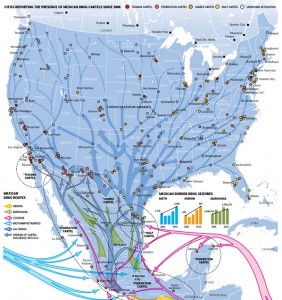By James Deater
Recently, there have been horrific events unfolding in small towns throughout the United States, where the loss of life has been unimaginable. As we continue to fight terrorism in Iraq and Afghanistan, utilizing our intelligence agencies and U.S. military to their fullest extent, there is a time-bomb ticking in our own backyard.
A portal hole has opened on the southwest border of the United States that has allowed this threat to invade and spread throughout our nation. That threat is the Mexican drug cartels. Make no mistake, these groups represent a clear and present danger to the United States. The cartels have shown their total disregard for human life. As recent as February 2012, many in the United States government wanted to classify them as foreign terrorist organizations.
There are numerous reasons to fear these groups; however, it is impossible to discuss all of them here. One of the most important steps is for law enforcement agencies and government policy makers to focus on the methods the cartels use to successfully smuggle tons of illegal drugs into the United States. The cartels have almost unlimited funds, proven by the elaborate tunnels found on a regular basis on the Southwest border, where money, weapons, people and drugs are smuggled. Imagine how tunnels exist that we haven’t located? And even more daunting, imagine the foreign terror groups who want to smuggle a terror cell or worse a WMD into the United States?
Some of our country’s small police forces along the southwest border have been fighting this battle on a daily basis for some time now, including the U.S. Border Patrol. However, I question the amount of support these departments and agencies are receiving, especially since this threat is imminent. How many more incidents on the border or within American cities need to occur before policy makers actually look at this issue seriously and responsibly? My concern is that it will take a catastrophic event before our government takes the appropriate action.
An article in the New York Times, The Reach of Mexico’s Drug Cartels, reports the U.S. Justice Department as saying Mexican drug trafficking cartels “represents the greatest organized crime threat to the United States.” The 2010 and 2011 National Drug Threat Assessment and the U.S. National Seizure System both show and state that Mexican drug cartels present a significant threat to the United States, and those cartels are already operating in countless cities throughout the country. A very recent article, Invasion of the Drug Cartels, published in a Canadian news source, the National Post, shows detailed graphics of cartel influence and operations throughout cities in the United States.

What are your thoughts and ideas on this issue?
Comments are closed.